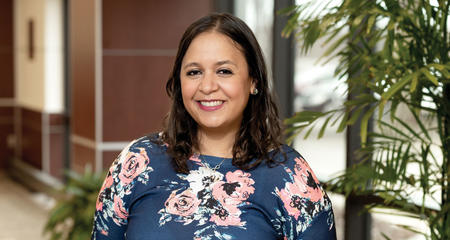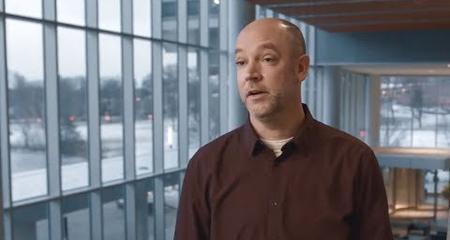Permanent Colostomy is Not the Only Option
It’s rare for a permanent colostomy to be your only option in the treatment of rectal cancer. That’s why a second opinion regarding your rectal cancer treatment is vital. In the U.S., more than half of all rectal cancer patients end up with a permanent colostomy, but that doesn’t have to be the case. The outcome can be very different when patients are treated by a highly trained colorectal surgeon using sphincter-sparing techniques.
The colorectal surgeons in the Colorectal Cancer Program specialize in treating rectal cancer with minimally invasive and sphincter-sparing techniques that can preserve normal bowel function.
Because of these quality of life issues, choosing the proper sequence of therapies and having skilled specialists carrying them out is essential in successfully treating rectal cancer. Keep in mind that rectal cancer patients:
- Might not need a permanent colostomy
- Might not need an open operation
- Might not need surgery at all
The right expertise, tools, knowledge, skill and experience can make a dramatic difference in your outcome and quality of life.
Specialized Expertise Matters
Medical studies have shown that surgical technique makes a difference in outcomes, especially when it comes to treating colorectal cancers. Our colorectal surgeons are fellowship trained, board certified and focused exclusively on colorectal diseases. They are skilled in the use of minimally invasive and sphincter-sparing surgical techniques. These techniques are also more likely to avoid damage to the nerves needed for normal urinary and sexual function.
Studies have also shown that hospital volume is associated with improved patient outcomes — the more procedures your surgeon and hospital perform, the more likely you are to have a positive outcome and a better quality of life.
Below are some of the surgical options available for treating rectal cancer:
- Transanal endoscopic microsurgery (TEM) — Some early-stage rectal tumors can be removed through the anus using special surgical devices. This procedure requires no incision and can be performed on an outpatient basis.
- Low anterior resection with colonic J-pouch anal anastomosis
- Intersphincteric resection for colonic pouch to anal anastomosis
- Wide local excision of low rectal cancers
- Laparoscopic management of rectal cancers
Avoiding Recurrence
Part of what distinguishes rectal cancer from colon cancer is that local recurrence rates are higher. And, if rectal cancer recurs, it’s more likely that treatment will lead to a permanent colostomy. Getting treated appropriately the first time around is key to avoiding recurrence. Your best chance of taking care of rectal cancer completely is during your first treatment approach. That’s one more reason a highly skilled colorectal surgeon and interdisciplinary team is key to achieving a positive outcome the first time around.
Radiation and Chemotherapy for Rectal Cancer
Radiation and chemotherapy play important roles in the treatment of rectal cancer. Depending on the location of the tumor and how far it has spread, pre-operative radiation therapy and chemotherapy are given at the same time to shrink the tumor. This approach makes it more likely that the tumor can be surgically removed using sphincter-sparing techniques. In these cases, radiosensitizing chemotherapy is used. This type of chemotherapy helps make radiation more effective.
Giving chemotherapy together with radiation before surgery to shrink the tumor has become a standard approach. This approach also helps reduce the risk of recurrence. In certain cases, radiation may also be given after surgery to treat any microscopic cancer cells that may have been left behind.
There are several chemotherapy and radiation combinations available to treat colorectal cancers, and your physicians will find the right treatment approach for you. The way chemotherapy is given, which drug, how much and how often are all determined based on the type and stage of the cancer and each patient’s needs. In many cases, the chemotherapy and radiation treatments would be given for about five to six weeks before surgery.
Because it is so important to accurately diagnosis rectal cancer, patients should undergo a transrectal ultrasound to accurately determine the stage of the cancer and whether lymph nodes are affected. Radiation oncologists in the Colorectal Cancer Program also use 3 Tesla MRI, a specialized type of magnetic resonance imaging, to help accurately diagnose and plan treatment for rectal cancers. This advanced equipment provides higher resolution and better visualization than standard MRI imaging.
For a few patients, radiation and chemotherapy may be all that is needed to successfully treat the rectal cancer, avoiding surgery completely. This is a determination that is made by an expert, multidisciplinary group of colorectal cancer physicians on an individual basis after thorough review of staging information.
Individual factors play into all treatment decisions. Patients need tailored therapy that is only determined by a team of specialists focused on colorectal cancer who understand the disease, know about the latest treatment advancements and work together every step of the way. The bottom line is that a patient with rectal cancer will have the best chance for a positive outcome at an academic institution with a coordinated, interdisciplinary colorectal team and the resources to develop the best individual treatment plan.
Virtual Visits Are Available
Safe and convenient virtual visits by video let you get the care you need via a mobile device, tablet or computer wherever you are. We’ll gather your medical records for you and get our experts’ input so we can offer treatment options without an in-person visit. To schedule a virtual visit, call 1-866-680-0505.
Recognized as High Performing by U.S. News & World Report
Froedtert Hospital is recognized by U.S. News & World Report as high performing in three adult specialties and 16 procedures and conditions, including cancer, colon cancer surgery and gastroenterology and GI surgery.More to Explore





